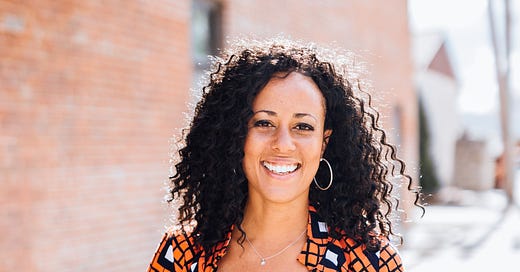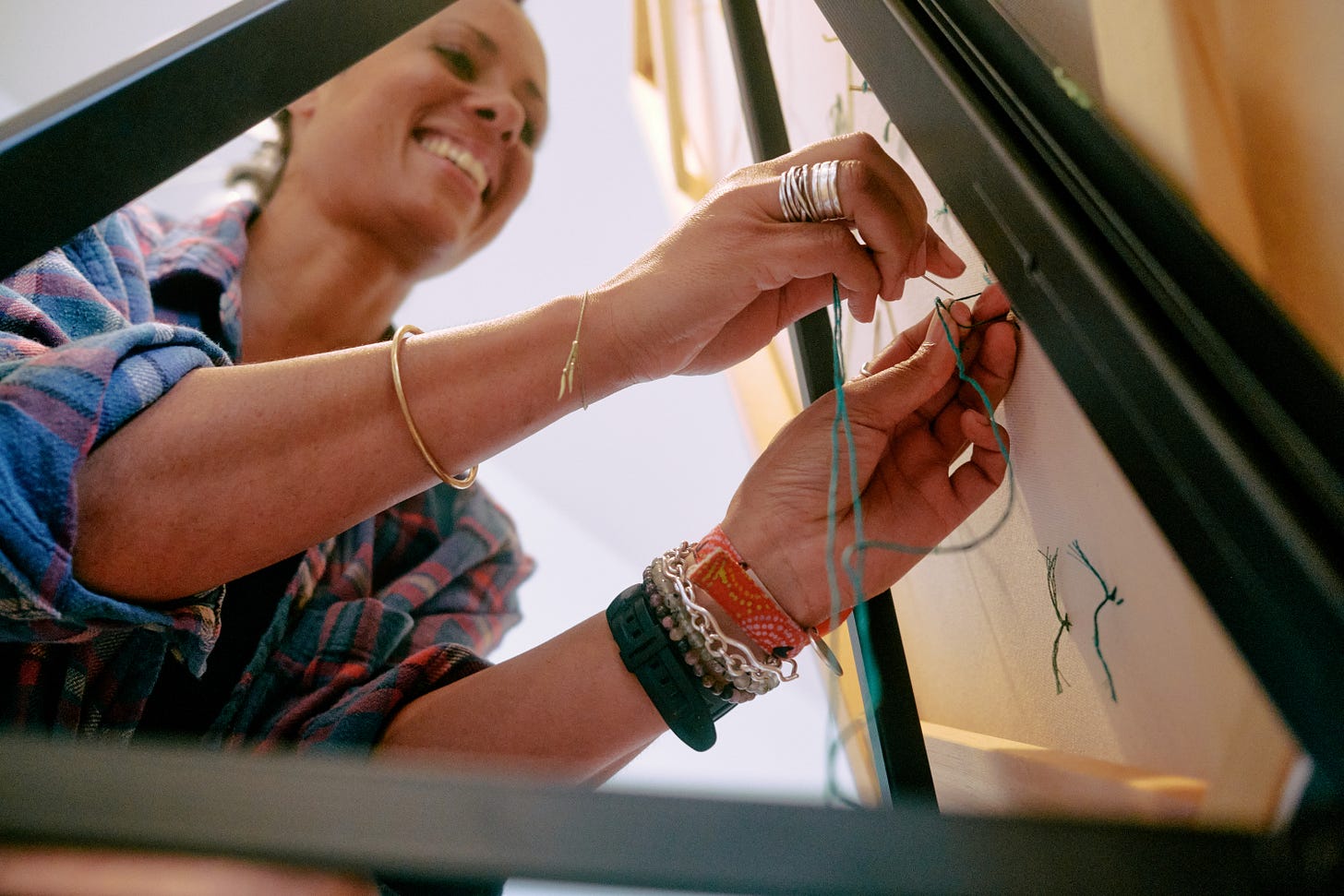“The core of everything I create is an attempt to create harmony out of dissonance. To create a peace and calm out of chaos.”
Akwi Nji tells me this during a phone call on a cold October Wednesday morning. I’m sitting at my desk in my home office, and we’re discussing her life and motivations as an artist. As she reaches the end of her thought, I feel the tension in my shoulders rapidly unravel and a clarity take its place. I recognize immediately why my body is reacting the way that it is; through her revelation, I’ve finally understood my own motivations as a creative.
This isn’t the first time Akwi has awoken something in my creative body. I first learned about her work when I attended Poetry Palooza in Des Moines last April. Her performance electrified me in a way I didn’t know was possible. As I wrote in my post about the event:
Akwi Nji started her reading by saying that she “makes things and encourages others to make things.” This sentence felt like a call to a creative energy that vibrated through the room, an energy that would take on a life form I felt in every inch of me.
I never knew a poetry reading could make me feel the way Nji’s reading made me feel.
The magic of an artist like Akwi, who is based out of Cedar Rapids, is her ability to help you see yourself. You can feel the source of natural energy from which she creates, and suddenly you must create yourself.
That energy has been hard-earned, cultivated and protected with a fierce joy that permeates her work. As a poet, spoken word performer, visual artist, communications professional — every medium provides Akwi the space to lean fully into her truth, to infuse every movement she makes with her artistic identity, and hopefully guide others tap the wellspring of creativity that she believes lives in all of us.
The Art of Finding Your Truth
I found it difficult to fathom that Akwi only felt complete in her identity as an artist in recent years.
“I always identified primarily only as a writer,” she told me. “I produced events that incorporated a variety of mediums, but it was always me curating experiences. I’d find visual artists, dancers, choreographers, musicians, and put them all in the same place at the same time. More recently, I realized, ‘oh, I could start being the one who creates all the things.’”
Her desire to create harmony from discord is rooted in her very identity. Born in Iowa City, her family quickly moved to her father’s home country of Cameroon. With a white, American mother and a relatively wealthy father, her peers viewed her as white. She told me always felt a bit misplaced in Cameroon.
That feeling magnified once she, her sister, and her mom moved back to Iowa to be closer to her mom’s side of the family. Around age eight, Akwi experienced a culture shock that would go on to impact her identity more than any other event: moving to Springville, Iowa.
I feel a flash of recognition when she tells me this. I grew up about 20 minutes away from Springville, a town with a population of 1,154. Our schools were in the same athletic conference. My high school boyfriend was from Springville. I know the area and people well, and I can understand why Akwi and her sister felt uncomfortable growing up in this rural area.
That discomfort led her to writing.
“I turned to poetry early in middle school, just because it was the only place where I could be myself,” Akwi said.
She began to build her identity as an artist. She developed a fascination with how different mediums formed relationships and communicated with one another. Art became her coping mechanism for the misplaced feelings she experienced in Springville, how she could communicate in ways that could transcend words.
While she may have identified as “only” a writer, she was trying her voice within different mediums and forms, even when outside forces tried to silence her. She mentions a particular experience with a 7th grade teacher that turned her away from creating for a bit. But that need to make sense of a senseless world prevailed.
Creating Harmony from Dissonance
The more I talk with artists, the more I understand the myriad of ways the world wants our voices to waver. And the more artists I talk with, the more I’m amazed at the volume with which we choose to speak anyways.
One of those pivotal moments for Akwi, when the chaos seemed too chaotic to create through, was 2020. Performing having been her primary identification as an artist, she suddenly no longer had that outlet. That meant she had no where to turn with her feelings when the world witnessed George Floyd’s murder by the hands of Minneapolis police in May of that year.
“I was just so filled with iridescent rage over how so many artists like me have spent most of our lives using art to bring attention to injustice. Then it takes a globe sitting around, unable to do anything else except for being on their phones, to see somebody die at the hands of a police officer, for people to say, ‘oh, maybe we should be thinking about this a little bit more,’” Akwi explained. “It was the kind of thing I would have normally written and performed about.”
Akwi began to understand the power of voice differently at that point. She chose to stop writing and performing, She destroyed much of her previous writing work, turning the hardcopy forms into visual art and deleting electronic files.
She leaned into visual artistry in a new way, channeling that creative energy into mediums she had never fully given herself permission to explore. The process transformed her sense of her own artistic voice, and she began to build anew.
“I told myself that I would just build a new foundation,” she said. “What does my writing look like, and what does my voice sound like, if I’m writing only what I want to write and not what I think an audience will want to hear?”
Akwi seems to relish in the freedom this new foundation has given her. I hear the smile in her voice over the phone as she explains how her motivations as a writer have changed.
“I used to create from a foundation of frustration and anger,” she told me. “I’m so happy now. I’m still creating about themes that are important — themes around gender, racial, and social issues. I’m addressing these really critical themes, but I’m addressing them from a very different angle. Starting from a place of joy and positivity doesn’t mean my head is in the sand. I think it’s finding a healthy balance of being aware of identity and addressing issues while also not allowing it to compromise my inherent joy.”
As artists, we understand how to source from our pain. The gargantuan feelings, the conflict, the world bending tension. It all makes for great fodder for exposing the ills plaguing us all.
But Akwi realized that she, and the rest of us, have the power in our voices to expose these ills from a place of joy. In fact, creating from joy often empowers much different ideas to rise up and save us from ourselves.
“It’s empowering in a different way,” she said. “I realized we don’t have to be makers of misery, or makers inspired by misery. Ahmaud Arbery’s murder was just before George Floyd’s murder, and I remember looking at my two kids and thinking, ‘as a mother, what do I teach them? What do I teach them about their own value and worth?’ And I realized I have to model joy and defiance. I told myself, ‘defiance looks like I am going to still choose to look out the window and still appreciate the sunlight.’”
We’re All Born to Create
Akwi is an award-winning communications professional. She owns her own marketing company, Powerful Over Pretty, and has provided communications strategy for businesses and school districts across the state. She speaks on the national level about strategic communications with a focus on PK-12 education.
You may assume, like I did, that this corporate work supports her artistic work. But for Akwi, the corporate work IS the artistic work. Because she never stops being an artist.
“I approach my marketing company like a full-blown artist. That is my identity. I am a full-blown artist,” she said. “The marketing and branding and communications projects that I work on are elevated because I’m approaching them through the lens of an artist.”
It’s a matter of prioritization. We all have to work to physically live, to sustain ourselves with food and shelter. Artists create to sustain ourselves emotionally and mentally. Akwi has answered the question of “which matters more?" by not allowing it to be asked in the first place.
“I believe we’re all born to make something and create,” she said. “I think we’re the most dissatisfied when we’re experiencing a situation at work where we’re not allowed to exercise a level of creativity — and creativity is the act of problem solving. The moment that I decided I would approach everything with the vocal, direct acknowledgment that I am primarily first and foremost an artist, everything changed for the better.”
Akwi has a keen understanding of why we’re often forced into the 9-5 way of living, the way this social construct can feel suffocating to those of us aching to break free of the strains of capitalism to pour our souls onto the world.
She just doesn’t believe these two identities need to be, or even should be, separate.
“When you lean into your full truth, when you say, ‘look, this is who I am, and this is what I offer.’ When you are met with the right conditions, under which people accept and embrace that, then you can’t help but be prolific.”
The Midwest Creative is a proud member of the Iowa Writers Collaborative. Please consider a subscription to my colleagues’ work to support storytelling across the state of Iowa. All of these authors provide content for free, with paid subscription options. Pick one or more, and help sustain this movement.







Thank you, Macey. A thought provoking read that has inspired me more to add more to my creative portfolio!
Thank. you for sharing these positive thoughts during challnenging time for artists struggling to remain creative in what can quickly become very depressing unless you can remain above the clouds to always see the sunshine.
Take Care